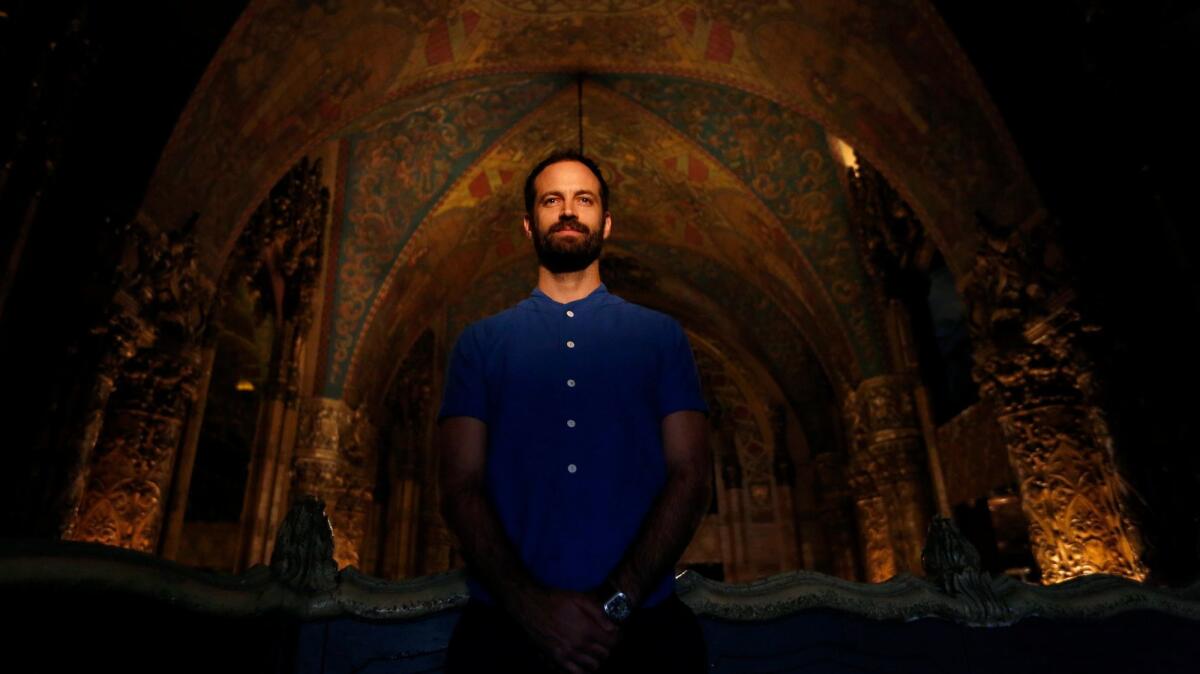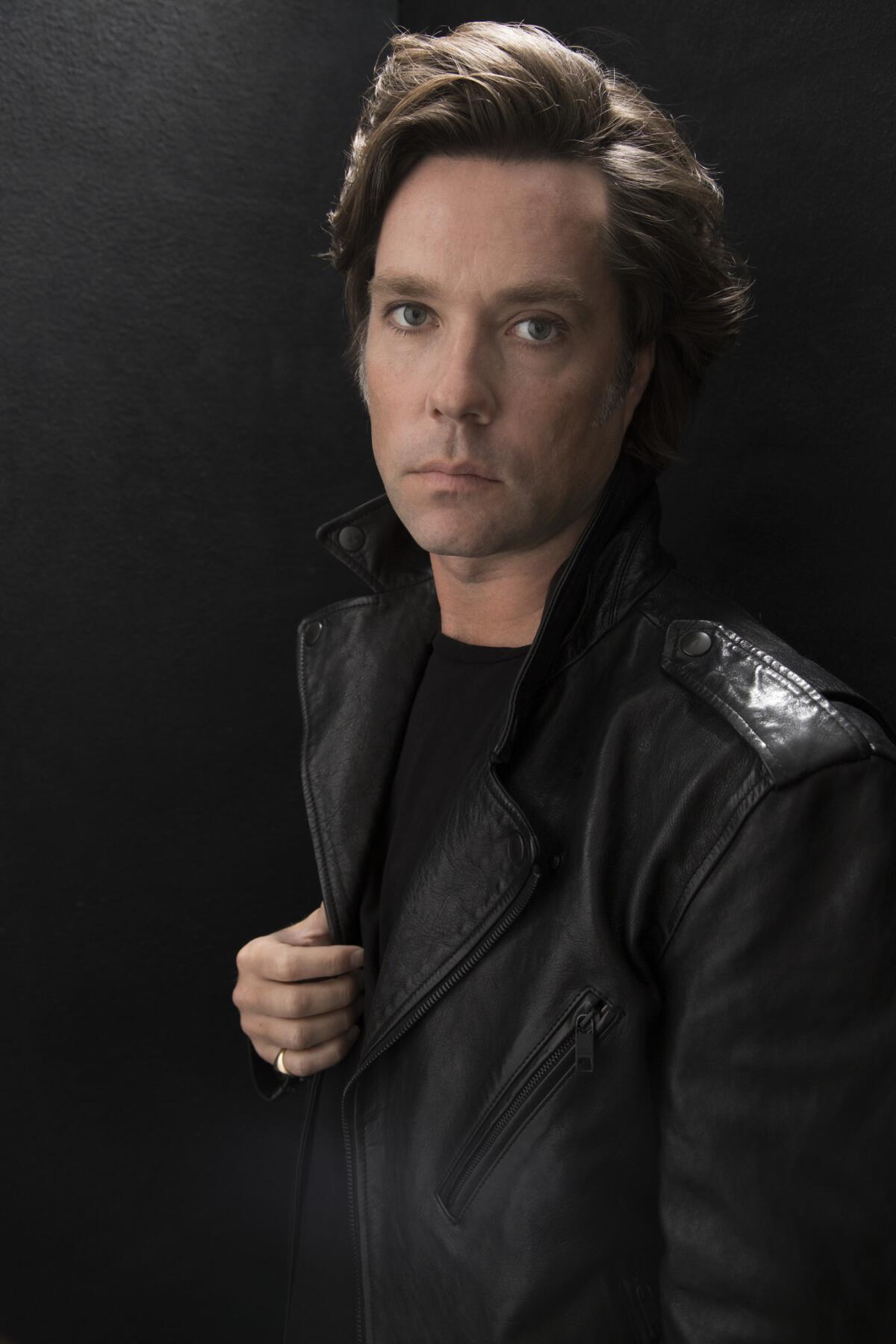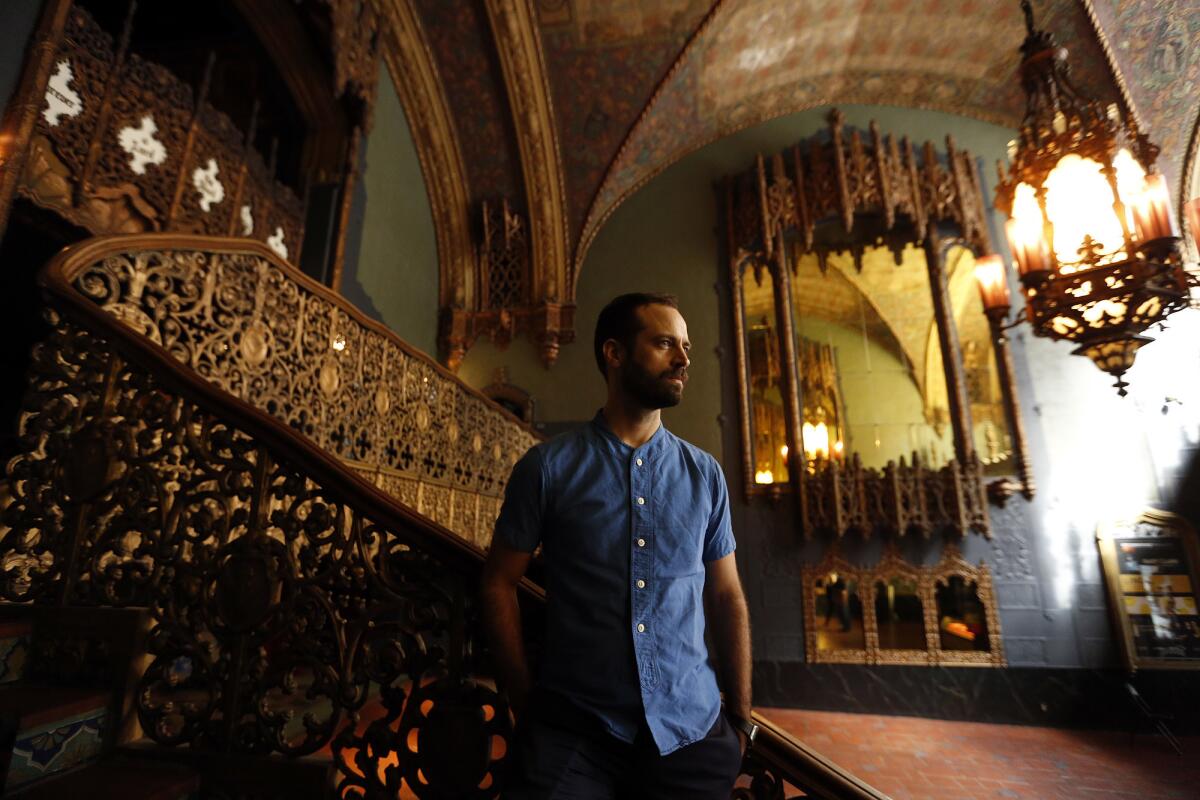How Rufus Wainwright and Benjamin Millepied came to collaborate on L.A. Dance Project program

- Share via
When Rufus Wainwright released his spare, piano-and-voice album “All Days Are Nights: Songs for Lulu” in 2010, Benjamin Millepied’s choreography muscles began tingling.
“The songs are almost like lieders,” said Millepied, co-founder of L.A. Dance Project. “They’re more classical in a way. They’re very melancholic. Sometimes it’s important to use music where there’s still room left for the dance.”
Wainwright will perform a medley of three songs from that album as part of L.A. Dance Project’s program Friday and Saturday evening at the Theatre at Ace Hotel. Millepied choreographed to the music a dance that he will perform with company member Janie Taylor.

“Thankfully he chose pieces of mine that, on the piano, are very easy to play — because if he’d gone for some of the more brutal material that I can sometimes write for myself, then I would have declined,” Wainwright said, laughing. “The idea of making a mistake while people are dancing is pretty frightening to me.”
The program will also include dance by Roy Assaf (an Israeli-born guest choreographer for Batsheva Dance Company) and Christopher Wheeldon (artistic associate of the Royal Ballet in London), music by Philip Glass and Arvo Pärt, and backdrops by artist Mark Bradford, whose work Millepied called “a true print of this city.”
“Of all the artists who work and live in L.A., he’s definitely the one whose work is grounded in the DNA of Los Angeles,” Millepied said.
The theme of the evening, if there is one, is Los Angeles.
“So much of my work is inspired by the people I work with,” he said. “I think, in a way, it’s a moment in society, it’s a moment in these dancers’ lives. So it does, to some extent, have a connection to the city and to my experience in the city, and just my life here.”
The Wainwright-scored piece is aptly titled “Homecoming.” Both composer and choreographer have recently returned to make Los Angeles home again.
Millepied, who was a star dancer with the New York Ballet and oversaw choreography for the 2010 film “Black Swan” (where he met his wife, Natalie Portman), moved here in 2012 and started his dance company, but left in 2014 to become director of the Paris Opera Ballet. He announced his departure from that post earlier this year, attributing it to a desire to foster his L.A. troupe — while also acknowledging that he and the Paris company were not a good fit.
SIGN UP for the free Essential Arts & Culture newsletter »
Wainwright moved to L.A. in the mid-’90s to launch his career as a recording artist, which has yielded nine studio albums and one Grammy nomination. His music has been dubbed “popera” for its synthesis of catchy tunes and lush, operatic construction, and his leaving L.A. coincided with a gravitation toward purer “high art.” He finished his first opera, “Prima Donna,” in 2009, and he is working on a second, “Hadrian,” which the Canadian Opera Company will premiere in 2018.
“Opera is my No. 1 squeeze,” Wainwright said, adding that this interview was interrupting a descending piccolo line he was writing for “Hadrian.” “But my husband, Jörn [Weisbrodt], is a huge balleto man, and over the years I’ve learned to appreciate it more and more.” Wainwright said his new opera has some ballet in it. “So I’m late to the ballet world, but, nonetheless, fully entrenched at this point.”
“Homecoming” is a good match for two very public men who have complicated relationships with both this city and the institutions of serious art. Millepied was criticized in Paris for trying to reinvent an old establishment too quickly, and Wainwright’s first opera — which suffered a turbulent birth after the Metropolitan Opera backed out of premiering it — was dismissed by several critics as a failure.
“‘Prima Donna’ is the work of a man who loves opera and the sensations it delivers without understanding how it is paced, or how it generates dramatic tension,” wrote the Guardian’s Andrew Clements.
“I think a lot of my idols were smashed,” Wainwright said of the “Prima Donna” experience. “But on the other hand, a lot of strong foundation was laid at the same time. So I still love opera, and consider it my kind of religion. But I’m a little wiser in terms of the pitfalls. But then on the other hand I feel maybe even a stronger need to tackle it fully, because once you dip your toe in, there’s no point in not getting totally wet.”
Both men, too, are at a crossroads between their present and past. Millepied said this performance will likely be his last time dancing.

“It’s always a big effort to get on stage and have other things I’m working on,” he said, somewhat casually. “If you don’t want to keep repeating yourself and your vocabulary, it’s probably interesting to keep experimenting and preparing, so you force your body not to go back to its habits and the way that you move.”
Wainwright isn’t ready to hang up his pop music shoes just yet. He hasn’t stopped writing songs, and recent events have only stoked that fire.
“I definitely think that there’s at least two more rounds left for me,” he said. “Because I did make a mark and I have a following, and especially after the election, and the fact that I’ve always been really honest about my political questions — I feel very much needed out there at the moment in the mainstream. So I have no intention of backing out of either world. If anything, I’ll just get deeper in both.”
Follow The Times’ arts team @culturemonster.
ALSO
My kingdom for a can of beans! A radical take on the Bard in 'Table Top Shakespeare'
A young playwright's quest to ask difficult questions about race, class and gender
Sondheim-Furth musical 'Merrily We Roll Along' remains a rutted road
FOR THE RECORD
9:25 a.m.: In the headline on an earlier version of this article, Rufus Wainwright’s last name was misspelled as Wainright.
The biggest entertainment stories
Get our big stories about Hollywood, film, television, music, arts, culture and more right in your inbox as soon as they publish.
You may occasionally receive promotional content from the Los Angeles Times.







